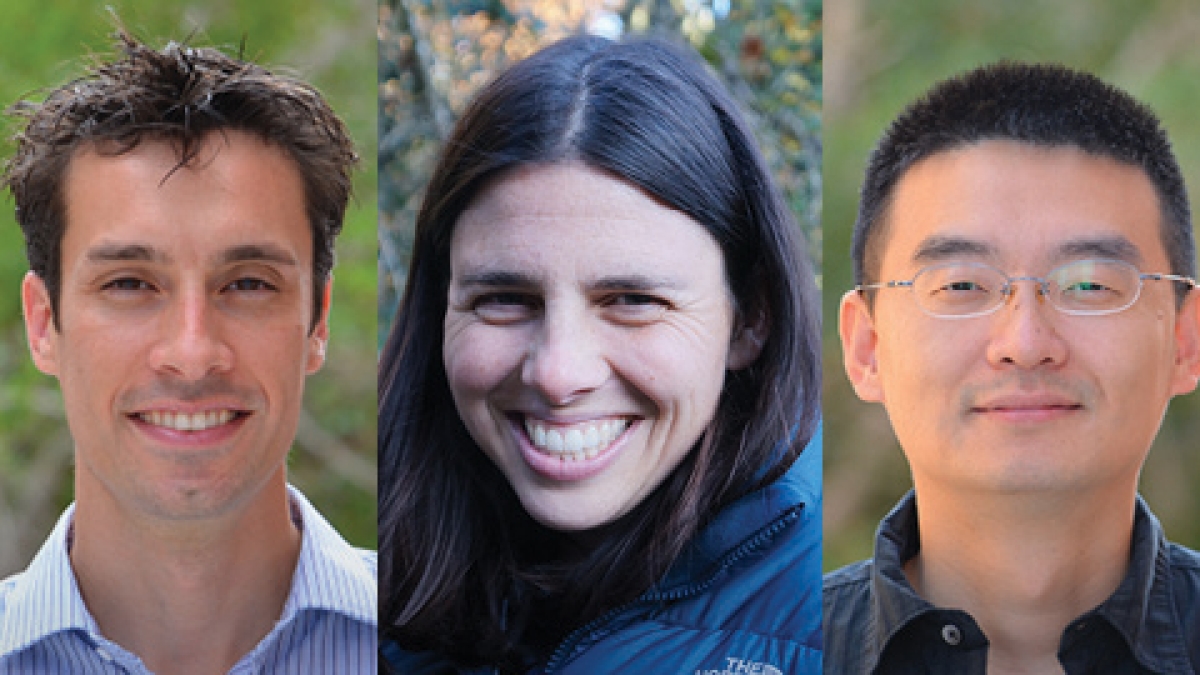Three new faculty members bring diverse expertise to School of Life Sciences

Arizona State University’s School of Life Sciences welcomes three new faculty members this academic year, with each conducting research they hope will enrich both the university and their respective fields of study. Along with their research endeavors, the trio will work in the classroom to share their expertise with undergraduate and graduate life sciences students.
Jason Newbern
Jason Newbern comes to ASU from the University of North Carolina at Chapel Hill, where he studied peripheral nervous system development during his postdoctoral research. Now, as an assistant professor in the school, he is refocusing his research to study the formation of the cerebral cortex – a structure that plays a key role in learning, memory and attention.
Through his investigations, Newbern said he hopes to understand why certain gene mutations cause neurological problems. He is particularly interested in syndromes caused by mutations that affect a signaling pathway known as Ras/MAPK. Neurofibromatosis Type 1 and Noonan syndrome are the most common in this family of syndromes. Children with these syndromes often exhibit some impairment of neurological function, which may include developmental delay, learning deficits, neuropsychiatric disorders or seizures.
“Children who have these disorders are typically pretty bad off,” Newbern said. “I think an achievable goal is to map the underlying pathogenesis of the neurological deficits they exhibit.”
This work may also provide some insight into neurodevelopmental changes observed in certain forms of autism or schizophrenia. Doing this, Newbern said, would bring his research team closer to finding ways to reverse neurological problems in those with mutated signaling pathways.
As for why ASU is the best place to conduct his research, Newbern said President Michael Crow’s vision of the New American University provides an inspiring platform for interdisciplinary research efforts.
“I am very much attracted to the model ASU uses for teaching and collaborative research, and trying to really serve a large proportion of the population,” said Newbern
Newbern added that he is looking forward to teaching neurobiology to undergraduate students, and hopes to develop a new course on nervous system development.
Sara Brownell
Assistant professor Sara Brownell is already brimming with excitement about beginning her work here, even though she will not arrive at ASU until January. With a doctorate in biology and master’s in education from Stanford University, she will study a diverse array of students – including students from ASU – to investigate undergraduate biology education.
“Universities train so many undergraduate students in biology across the country and need to be doing a better job at it,” Brownell said. “I hope my research can help with this.”
Specifically, Brownell wants to investigate the positive impacts of including authentic research in introductory biology lab courses and explore inaccurate ideas students may have about biology topics. She plans to design a programmatic assessment that could track biology majors’ understanding of core concepts as they progress through their college careers.
Brownell said she is delighted to work with the School of Life Sciences, which is already doing great things in biology education, and she really wants to explore the diversity of students on campus. According to her, many studies have not had as large and varied a sample as ASU’s population offers.
Xuan Wang
Xuan Wang joins the school as an assistant professor with a focus in microbiology and metabolic engineering. Specifically, he wants to turn various types of cells into microbiological factories, making biofuels and other valuable chemicals out of waste products.
“The whole world is unsustainably dependent on petroleum,” Wang said. “Our transportation fuels and many chemical products including solvents, fertilizers, pesticides and plastics, are derived from petroleum. To keep our society advancing, we have to find a sustainable supply of energy and chemicals. If we want to decrease the demand for petroleum, I believe renewable chemicals by microbial production will be part of future solutions.”
Ultimately, Wang would like to increase the efficiency of the biological synthesis process so the valuable chemicals created by microbes are cheap enough to compete with petroleum-based chemicals. To reach that point, Wang and his research team will work on manipulating the genomes and metabolism of many microbes to increase the efficiency of these microscopic factories.
Wang shared he is pleased that other faculty members on campus have similar research interests, and excited for the teaching opportunity ASU offers, as he had few chances to improve his teaching skills as a research faculty member at the University of Florida.
“The one thing I realized is that teaching can make a better researcher,” Wang said. “Sometimes when I teach a concept to a student, it’s during that process I am inspired. I can get unexpected ideas from my students, and even unexpected ideas from myself while preparing teaching materials.”